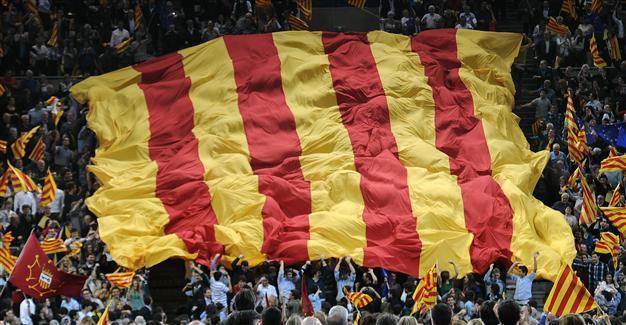Catalans vote in fight for statehood
BARCELONA - Agence France-Presse

A giant Catalan flag is displayed by supporters of Artur Mas, current President of Catalonia and leader of the CiU during a final meeting for his re-election campaign on November 23, 2012, in Barcelona. AFP Photo
Independence flags fluttering from balconies, Catalans voted today in an election that could set the region on a path to divorce from Spain.
Artur Mas, president of the northeastern region, is promising to hold a referendum on self-determination if he wins a mandate.
The prospect of a break-up of Spain sparked an open conflict with Madrid and overwhelmed debate about the region's sky-high public debt, savage spending cuts, unemployment and recession.
An independent Catalonia seems far off, however.
Prime Minister Mariano Rajoy's right-leaning government says talk of Catalan independence ignores the constitution, flies in the face of common sense and hurts all Spaniards at a time when they need to be united.
The vote could still drive a wedge into the eurozone's fourth largest economy as it fights the deepest
economic crisis since the return of democracy after the death in 1975 of General Francisco Franco.
"This could be an historic moment," said 27-year-old sociologist Andreu Camprubi waiting to cast his vote for a leftwing pro-independence party at Barcelona's Pompeu Fabra University.
"But I think this campaign has been too focused on the Catalonia-Spain polarisation and they should have discussed other matters in the crisis," he said.
Latest polls show the 5.4 million voters giving Mas's ruling nationalist Convergence and Union alliance a win that falls short of the absolute majority he is seeking.
Surveys a week before the vote showed Mas's alliance taking 60 to 64 of the 135 seats in parliament, not far from the 62 it now holds, with Rajoy's Popular Party and the opposition Socialists fighting for second place.
Nevertheless, pro-referendum parties are widely expected to enjoy a majority in the new parliament.
If there was a referendum on "self-determination", Catalans would vote in favour by 46 percent to 42 percent, according to a survey in leading daily El Pais.
At Mas's last campaign rally on Friday 18,000 people crammed into a Barcelona stadium, chanting "Independence!" in unison and brandishing a sea of Catalan and European Union flags.
"We are not vassals of the Spanish state," the 56-year-old, bespectacled Catalan leader declared to delighted supporters.
Catalonia, which traces its origins back more than a millennium, is proud of its language and culture, both of which were suppressed under Franco's rule.
The region was welded to Spain at the nation's symbolic birth when Queen Isabella of Castile and King Ferdinand of Aragon, which included Catalonia, married in 1469.
Now the region of 7.5 million people accounts for more than one-fifth of Spain's economic output, a quarter of its exports, and one of the world's greatest football teams, Barcelona FC.
But Catalonia also has a 44-billion-euro debt, equal to one-fifth of its output, and was forced to go cap in hand to Madrid this year for more than five billion euros to help make the payments.
A growing sentiment that Spain is the cause of Catalonia's financial troubles is at the heart of the national split.
Mas accuses Madrid of raising far more in Catalan taxes than it returns and estimates the gap, or fiscal deficit, at 16 billion euros ($21 billion) a year -- a figure Madrid disputes.
Emboldened by huge protests in Barcelona demanding independence on Catalonia's national day, September 11, Mas demanded greater taxing powers from Rajoy.
When he did not get the concessions he was seeking, he called the snap election.
"Even Mas seems to be cautious in calling for the region's full autonomy," said a report by London-based IHS Global Insight analyst Blanka Kolenikova and economist Raj Badiani.
"Such a prospect would indeed open Pandora's Box, including a constitutional crisis in Spain; possible contagion to other peripheral regions with sovereignty aspirations; a blow to Spain's public finances; but also questions over whether a Catalan state, alongside Spain and within the European Union would be viable," it said.
